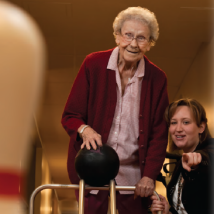
If there was a course Shari Jeffries might have wished Lethbridge College’s Therapeutic Recreation – Gerontology (TRG) curriculum included, it would be drumming. Jeffries, a 2008 graduate and now a recreational assistant at the Bethany Care Centre in Cochrane, is initiating a program for her elderly clients that will have them beating on 18 Native American and African drums, the first program of its kind in a facility of this kind.
“Research has shown that the rhythmic movement can reduce stress, manage pain, and re-organize the brain,” says Jeffries. “This is important for residents with dementia, Alzheimer’s or Parkinson’s and similar conditions.”
Jeffries has been asked to present the outcome of the drumming program to second-year TRG students at Lethbridge College this September.
The goal is get students to think differently about recreation. So, drumming may well be added to the repertoire of geriatric specialists in the coming years. Are you ready to get down with the music? To their credit, many baby boomers, now entering their senior years, are staying fitter and healthier than the generations that preceded them. They have more disposable income and a desire to bop till they drop. “People entering their 60s now are healthier than those in their 60s 20 years ago,” says Kathryn Ervin, a Lethbridge College TRG instructor.
“We all hear about the 85-year-old that goes skydiving. Soon those people will become common-place, not to mention the 100-year-old marathon runners.” But sooner or later, they will place huge demands on the therapeutic recreation field and properly trained practitioners will be required to keep them active as they enter care facilities.
The college’s TRG program is one of the few in Canada that trains professionals to work directly with our aging population. It is unique because it specializes in gerontology, the study of the social, psychological and physical aspects of aging.
Graduates of the program go to work in the growing number of long-term care and supportive-living facilities.
“Therapeutic recreation is about helping people continue to live a balanced life,” says Ervin. “Keeping people engaged in recreation leads to a longer and more enjoyable life.”
And no one knows this better than she. A 1990 graduate of the program, Ervin went on to a 16-year career in the therapeutic recreation field. In 2004 she came back to the college to teach part-time and in 2006 became a full-time faculty member.
“The benefits of recreation are huge and go far beyond the physical,” says Ervin. “Individuals can make choices about the activities and their level of participation. They become competent in their activities. They have control and, in turn, they become more motivated. All of these factors are particularly important as we age.”
In 2008 the TRG program won a series of awards from the Alberta Therapeutic Recreation Association.
“We really swept the awards ceremony that year,” says Ervin. “One instructor award and two student awards; it was hard to contain our excitement.” Colleen Moses, a 2008 graduate and one of the student award winners, says TRG considers the whole person. “Imagine our lives without recreation; not just the physical aspects, but imagine not being able to read, watch television or socialize with friends,” says Moses, who works specifically with residents with dementia at St. Therese Villa in Lethbridge. “Some seniors go through that.”
That was her reason for entering the field. Moses began working as a homecare assistant and wanted to do something about the isolation she saw in some of her clients. “Some of them only wanted someone to talk to,” she says.
But she credits her grandmother as her real inspiration. “I remember when I was five going to the seniors centre with my grandmother and dancing the hokey-pokey. Even something so simple can bring incredible enjoyment.”
At St. Therese Villa, part of Covenant Health, Moses employs different methods and resources when working with her clients. “We delve into their past using things like music, dolls and art,” she says. “Talking about their past lives is very therapeutic. They are really a fun population because they set aside many of their inhibitions.”
Jeffries came into the program from an entirely different field, an English teacher who ran a tutoring business in Drayton Valley. She began taking Therapeutic Recreation courses through distance learning.
In 2006, Jeffries began working at Bethany Care Centre and decided to complete her education. So, at 50, she attended her last year at Lethbridge College.
“The instructors supported me and helped me with scheduling, knowing that I was commuting to and from Cochrane each week,” says Jeffries.
After graduating, she started full time at Bethany and, besides the drumming program, is also responsible for creating a team approach to evaluating residents’ needs.
“We take a minimum data set of information from the residents: their likes and dislikes, their abilities, etc. During the evaluation we involve all members of the team, not just the recreation therapists.”
By using a more integrated approach they can build a better picture of each resident and develop a program that best suits them. This team-based approach has now been adopted by the other five sites at Bethany.
When she presents her drumming program results on campus this fall, Jeffries will complete the circle of learning so valued at Lethbridge College: a former student who brings back to the program the knowledge she has gained in the world.


